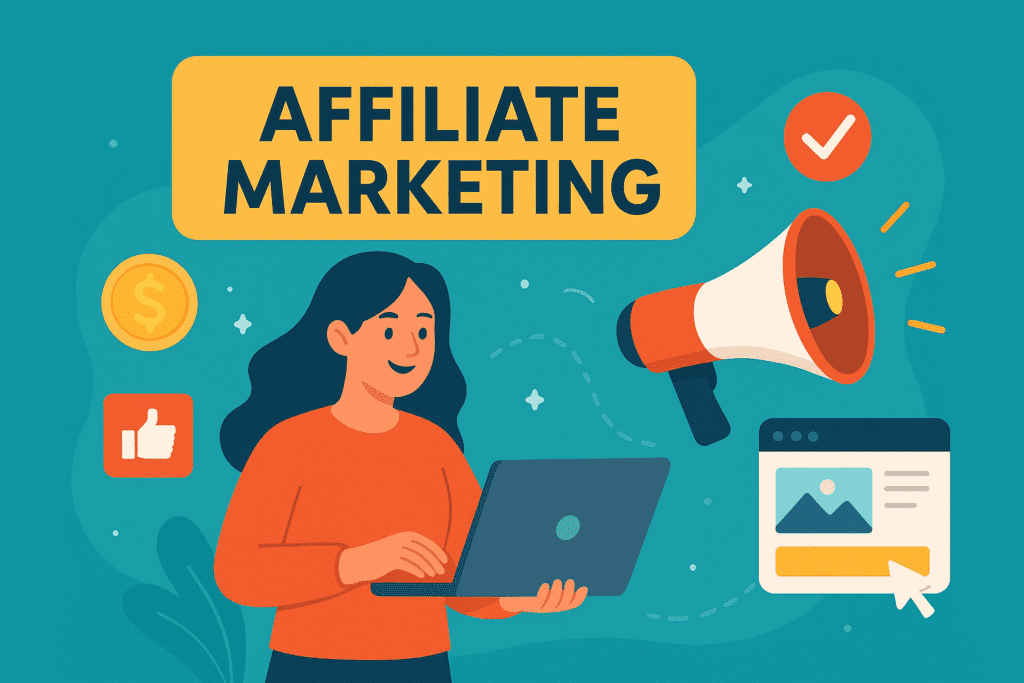While watching YouTube or while scrolling through Instagram, you might have encountered your favourite influencer introducing a product they are using to their audience through shorts or long-form videos, and they might have tagged that product and included a link for their audience to check out this product and purchase it.
Chances are you might have clicked on these links to know more about the product “your friend on the internet” talked about. Did you know that the influencer promoting the product earns a commission if someone in his/her audience happens to make a purchase through the link they shared?
This type of marketing is called Affiliate Marketing. This blog introduces you to digital marketing, how it works, and which are the popular channels through which affiliate marketing is carried out

What is Affiliate Marketing?
Affiliate marketing is a type of digital marketing where an affiliate shares the products or services offered by another company or person to his or her audience via an affiliate link and earns a commission each time a person buys the product through the affiliate link they provided.
Affiliate marketing is beneficial to both the company and the affiliate alike as it provides a passive income source for the affiliate and improves visibility and acts as free promotion for their product or service.
Influencers typically share affiliate links of products aligning with their niche, as their audience already has trust in the person when talking about their niche. This credibility or trust the influencer already possesses is naturally leveraged for making sales through affiliate links.
For followers of a beauty blogger, it is only natural to see a new natural moisturiser for sensitive skin tagged in the Instagram shorts of the influencer they are following. For the moisturising cream’s brand, it is free promotion and added visibility, and for the influencer, it is a side hustle that earns her decent money.
How Does an Affiliate Marketer Make Money?
An affiliate marketer earns through commissions from sales that happen through affiliate links he/she shared. The actual money earned can vary from 5% to 20% of the price of the product or service they promote. It is at the lower range for low-price, high-volume items like beauty products, and for high-ticket items like websites, web hosting services, etc., affiliates earn a larger chunk of money.
There are three types of payment in the affiliate marketing world:
- Pay per Sale – The affiliate gets paid for each purchase made through the affiliate link.
- Pay per Click – The affiliate earns for each click, even if a purchase doesn’t happen.
- Pay per Lead – The affiliate gets paid for actions like filling out forms or subscriptions.
Popular Channels for Affiliate Marketing
Blogs
Blogging is an effective way to promote products by writing product reviews or by tailoring an article related to the niche of the product and naturally placing an affiliate link inside the content.
YouTube
YouTube works really well for all sorts of marketing activities. Various content formats like product reviews with links, tutorials for products, and unboxing videos can be curated for the promotion and sales of products.
Pinterest / Facebook / TikTok
Create short videos, posts, or reels and include the affiliate link in the caption or bio for promotion.
Podcasts
The power of podcasts can be used for the promotion of products. You can simply recommend the products in your podcasts and drop their link in the description.
How to Do Affiliate Marketing for Beginners
1. First, Choose a Niche
Pick a subject that interests you, such as travel, fashion, technology, fitness, beauty, or finance.
You should be able to confidently and regularly discuss your niche.
2. Select Affiliate Networks
There are thousands of affiliate programs out there. Among the most well-liked ones are:
- Amazon Associates (a variety of goods)
- ClickBank (online goods)
- ShareASale (different brands)
- CJ Affiliate (large corporations)
- Impact Radius
- Rakuten Advertising
Affiliate programs are also available for many individual brands.
3. Produce High-Quality Content
As an affiliate marketer, your primary responsibility is to produce helpful content, such as blog entries, videos, or reviews.
Trust is increased by quality content, and sales follow.
4. Improve Traffic
Generate traffic to your content by optimising your youtube channel, your website or instagram, whichever digital channel you are using for marketing.
5. Track and improvise
Use analytics tools to track and see which affiliate links are doing better. Then adjust your strategy appropriately.
Pros of Affiliate Marketing
- Low Investment
You don’t need to hire employees, create products, or buy inventory. You dont have to spend any money out of your pocket to do affiliate marketing - Earning from Passive Income
Once your content is published, you can earn money from your content 24/7, there is no additional effort you need to put to earn from it. - Flexibility
You can decide on which products to promote. You can choose to only promote products that align with your passion. - No Customer Service
You just focus on promoting; the company takes care of customer service, shipping, and delivery. - Huge Market Opportunity
Every niche has an affiliation opportunity, whether it is for digital services or physical products.
Affiliate Marketing Drawbacks
Affiliate marketing isn’t flawless, of course. There are additional difficulties to take into account:
- Earnings Take Time Gaining trust and beginning to make a steady income could take months.
- Reliance on Other People The product, website, and policies of the merchant determine how much money you make. Your earnings cease if their program is shut down.
- Intense Rivalry Fashion, technology, and travel are examples of popular niches that can be highly competitive.
- Low Commission Rates Are Possible Small commissions are offered by certain affiliate programs, particularly for low-cost goods.
- The Necessity of Traffic Your links won’t result in sales if your content doesn’t receive enough visitors.
Tips for Success
- Be sincere, and only promote products you genuinely believe in.
- Provide Value Before You Sell: Instead of merely striving to sell, help your audience with problems.
- Use SEO: Optimize your YouTube channel/blog for search engines.
- Diversify Your Programs: Do not solely rely on one network to provide you with affiliates.
- Make Your Own Voice, Style, and Logo to help people always remember you.
- Engage with Your Audience: Be real, respond to every comment, and answer questions.

